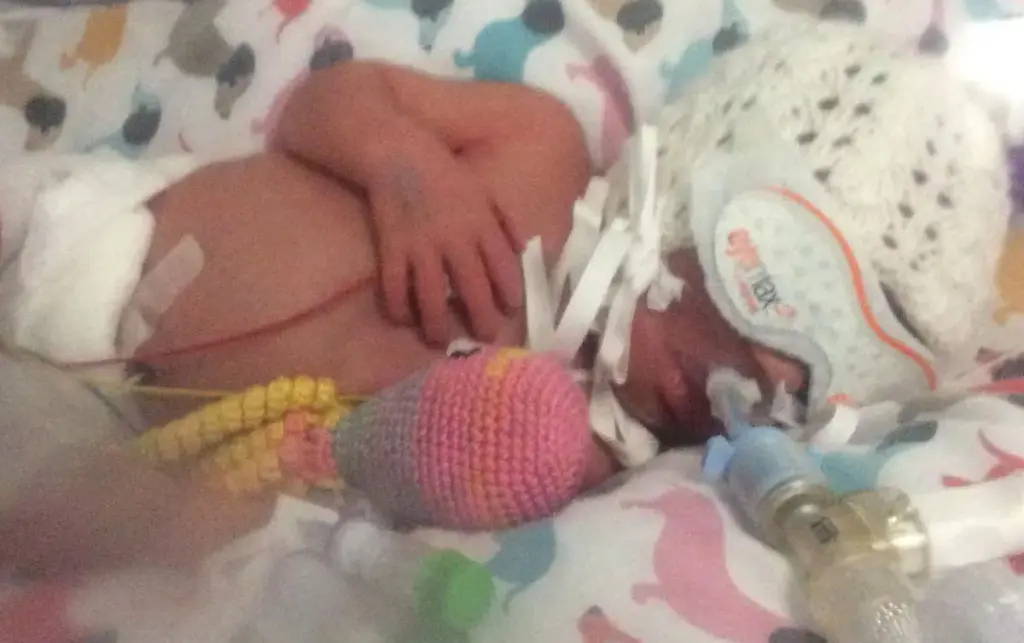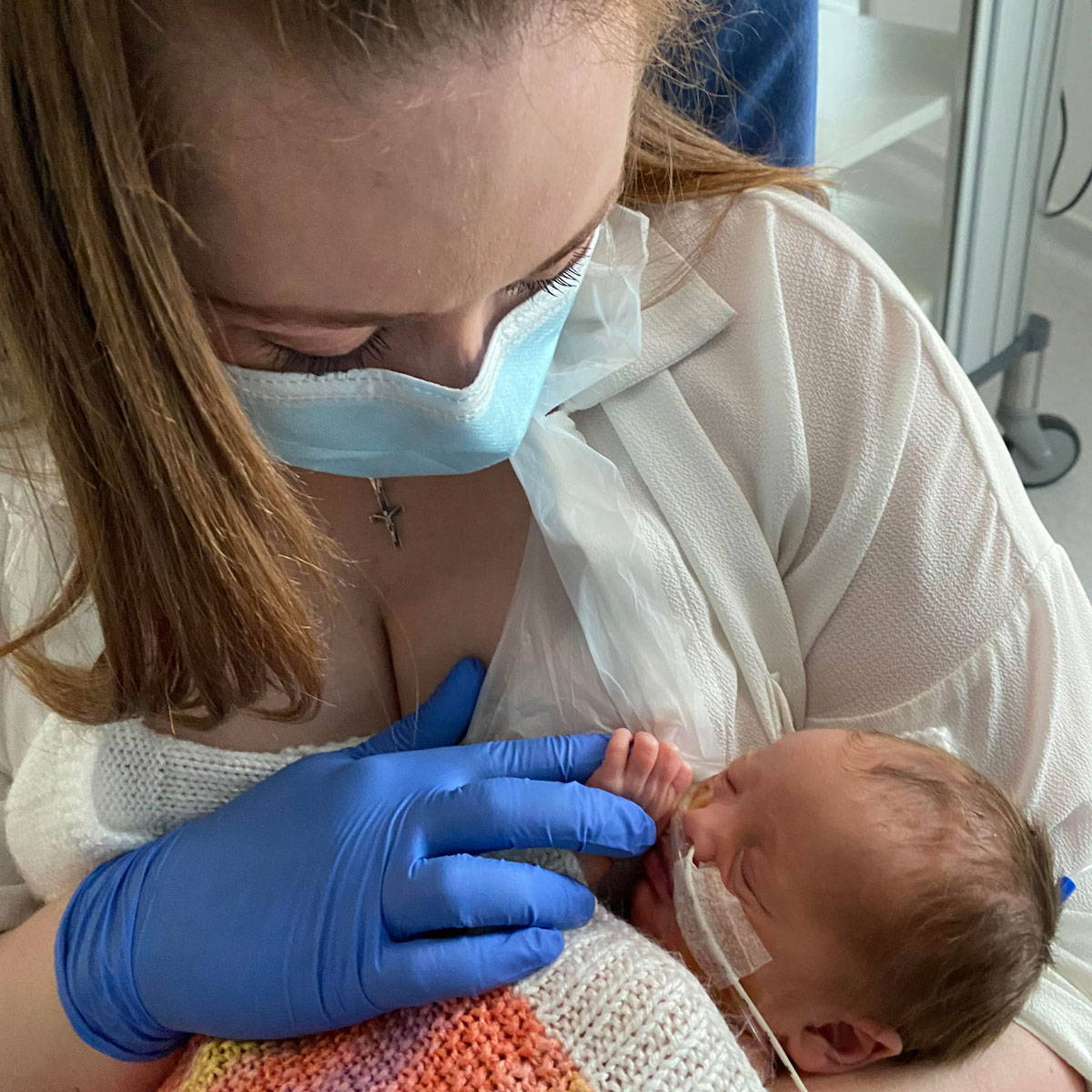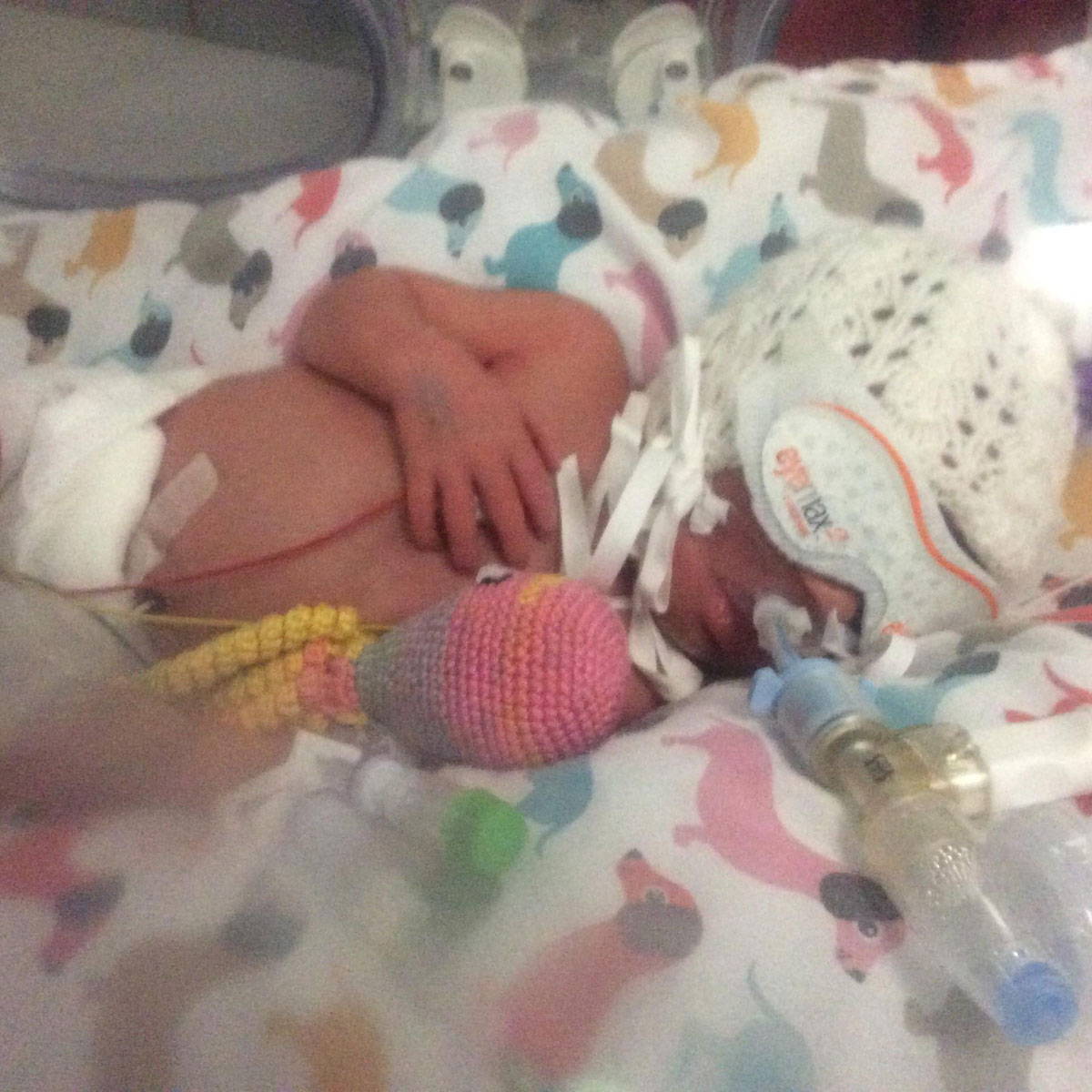
Share
World Prematurity Month
Guest Blog from Ickle Pickles

As part of World Prematurity Awareness Week, we caught up with Gina Glover from Ickle Pickles. Having documented her own journey as a preemie mum on her Instagram account @mrsgglover, she knows the importance of supporting charities such as Ickle Pickles and the vital work they do to support families with sick and premature babies.
Here’s her story…
In February 2021 I was 7 months pregnant and so excited to have our second baby.
Frankie, our 18-month-old, kept touching my tummy and saying, “baby” – she couldn’t wait to meet her new brother or sister.
I woke one cold morning with a high temperature and constant cough. After a couple of days, my chest got tighter and tighter, I was struggling to breathe. My husband called an ambulance. When I arrived at the hospital, I was taken in via the fire exit and service lift up to an isolation ward. The news I already knew was becoming a reality….
I had Covid.
I was utterly exhausted and ALONE. I began hallucinating, seeing dark frightening shadows all over the room. I texted my family in the early hours telling them how much I loved them as I honestly thought I wasn’t going to make it and at one point, as terrible as it sounds, I wanted to give up. I was pumped with magnesium sulphate for over 12 hours to keep me and my baby safe, as well as having steroids to help develop my baby's lungs.
The following morning the consultant in his full PPE stood across the room from me and said, “we are going to deliver your baby now”. I just cried and asked for my husband… I was only allowed a short call with him from the trolley as I was being rushed into the theatre. I keep asking the consultant, “will my baby be okay?” He said, “you need this c-section to save both your lives”.
What seemed like a few minutes later the consultant held up my tiny baby, I could see she was a beautiful baby girl – but I couldn’t touch her or reach out to her - she didn’t cry – I was surrounded by a room full of strangers.
They resuscitated and stabilised my daughter for about 45mins behind my head. I had tears rolling down my face as I was too weak to move my head around to try and see her. I was assured she was doing OK but I had no idea. She was then taken to the Neonatal intensive care unit – I just remember seeing a tiny figure being wheeled away in a life-saving incubator.
I was then moved to intensive care where one of the nurses handed me a brown envelope, inside was a picture of my tiny baby. Again the tears rolled down my cheeks as I held the picture, the nurse then gave me a knitted patch which she explained was a bonding square, which had been in my baby’s incubator - it meant I could smell her.


Over the course of the next few days, I felt alone and scared! I was poked with so many needles that my veins started to collapse. My oxygen levels were dangerously low, I was on a ventilator and needed nebulizer therapy to help me breathe. I was bedridden for days and mortified when I had to have bed baths (I was only 36).
My baby girl wasn’t doing too well either - she was losing weight and struggling to breathe. She needed to be moved to a hospital that could provide a higher category of care. The specialist ambulance for premature babies transported my tiny girl to a hospital an hour and a half away that had the life-saving equipment she desperately needed.
I was beside myself - lying in the basement of the hospital which had been turned into the Covid Intensive Care Ward. My husband Dean sent me a picture of Frankie, my 18-month old little girl playing in the snow in our garden. I missed her first snow day.
Each day the consultant gave me updates on how my baby was doing, they said she was stable and a fighter. I’d started to regain my strength and moved from Intensive Care to a ward. Finally, I got better and I was allowed home to see and hug Frankie and my husband. But my little baby girl was still fighting for her life and I still hadn’t held her or had the chance to bond with her.
After countless failed attempts of trying to physically see my baby, fourteen days after I gave birth, my local hospital called to let me know my tiny baby girl was being transferred back that afternoon by a specialist ambulance. I broke down, I explained I still hadn't meet my baby and the news I had been longing to hear finally came as the nurse said I could come in meet and hold my daughter.
I held my baby in my arms for the first time. To say it was an emotional meeting her is an understatement. We still hadn’t named her. I had my heart set on Nancy but after seeing this beautiful tiny baby she just wasn’t a Nancy, she was definitely a Bonnie.
Bonnie spent a total of 7 long weeks on a Neonatal intensive care unit. Every day my husband and I took it in turns to travel 50 minutes each way to see her. It was a rollercoaster journey - one day Bonnie was progressing by being weaned off Vapotherm which helped to expand her lungs – the next she wasn’t so well struggling with destats which meant her oxygen levels were dropping.
Bonnie was eventually discharged needing full-time oxygen and meds after 7 long weeks. She is now 17 months old and has been weaned off all her medication and is thriving!
Joining the Ickle Pickles team allows me give back for the care that Bonnie received.
I will forever be in debt to all the lifesaving equipment and medical staff that saved Bonnie’s life and mine.
One in eight babies are born prematurely - in the UK that’s over 90,000 babies every year.
Ickle Pickles are the smallest and sickest babies who need intensive care in neonatal units
Ickle Pickles can be full term babies (40 weeks) requiring treatment or surgery or more likely babies born prematurely (before 37 weeks). Babies born before 27 weeks are classed as extremely premature and it is often these tiniest babies who need the most help.
Since 2009, the Ickle Pickles children’s charity has been raising money for the intensive care equipment that treats these babies and helps to keep them alive....
Thank you so much to Gina and the Glover family for sharing their story with us.
For more further advice and support, as well as other ways you can help support the vital work that Ickle Pickles do, visit their website.

